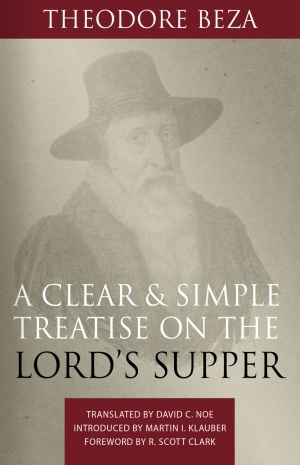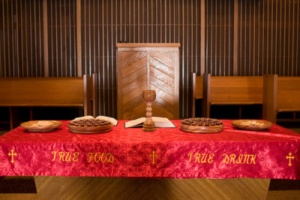In one of Humphrey Bogart’s (1899–1957) most famous scenes, from Treasure of the Sierra Madre (1948), he asks some bandits, who claimed to be Mexican Federal Police, to show their badges. Their famous reply, which has been oft misquoted, was: Badges, we . . . Continue reading →
Lord’s Supper
Heidelberg 82: The Jeopardy Of The Supper
82. Are they then also to be admitted to this Supper who show themselves by their confession and life to be unbelieving and ungodly? No, for thereby the covenant of God is profaned and His wrath provoked against the whole congregation; wherefore . . . Continue reading →
With The Reformed Pubcast On The Means Of Grace
What do sacraments do? Do they anything or are they just rituals we perform? These are some of the questions Les, Tanner, and I discussed on this episode of the Pubcast. The most fundamental question is whether God ordinarily uses means? In . . . Continue reading →
Coming Soon: Theodore Beza On The Lord’s Supper
Theodore Beza lived from 1519 until 1605. This means that he was a boy when the Reformation occurred and was nearing his death as the controversy between Arminius (whom Beza taught in Geneva) and the Reformed churches was developing. In between, he . . . Continue reading →
May A Christian College Administer Communion?
Andy Smith writes to ask about the administration of communion outside of the visible, institutional church. Specifically he writes to ask whether a Christian college or university may administer communion in chapel or in some other setting but the question is whether . . . Continue reading →
The Evangelical Fall From The Means Of Grace
The prayers had been offered, the promises read, and the psalm sung. Two princes stepped forward to receive Communion, but the deacon refused to give them the cup. The superintendent of the city’s pastors ordered a second minister present to take the . . . Continue reading →
Turretin Answers Objections Against Infant Baptism (2)
VI. To no purpose is the reply: (1) “Hence it would follow that the Lord’s Supper should also be administered to infants because the thing signified belongs to them.” Although the same thing is signified in both, still there is a difference . . . Continue reading →
Paul On The Sacred/Secular Distinction In 1 Corinthians 8–11
Over the last century it has become widely held among Bible-believing Christians that we ought not recognize a distinction between the sacred and the secular. A Google search for “sacred secular distinction” brings up plenty of examples of such a rejection. The . . . Continue reading →
Synod of Herbon (1586): Weekly Communion Most Corresponds To Christ’s Ordinance
45. The Lord’s Supper shall be celebrated at least every month, and everyone at their location should strive that if the whole congregation cannot participate every Sunday (which most corresponds to Christ’s ordinance and to apostolic custom and is greatly desired), at . . . Continue reading →
Prima Facie Evidence Against Intinction
Intinction is the practice of administering the Lord’s Supper (Holy Communion) by dipping the bread into the wine rather than by giving the cup directly to the laity. It is not in itself a denial of the cup but arguably it is . . . Continue reading →
Between Magic And Mere Memory
When Christians receive the Lord’s Supper or when people are baptized, what happens? Is it the case that, as Rome claims, at consecration, the elements of bread and wine are transformed (transubstantiated) so that they are no longer, in substance, bread and . . . Continue reading →
What Do We Mean By Sacrament, Sign, And Seal?
The Reformed churches and Reformed theologians (i.e., those who confess and teach within the bounds of the Reformed confessions, e.g., the French Confession (1559), the Scots Confession (1560), the Belgic Confession (1561), the Heidelberg Catechism (1563), the Second Helvetic Confession (1566), the . . . Continue reading →
Should You Give Yourself Communion At Home?
Joe writes to ask Hi Dr. Clark, My church is currently streaming service online and advocating for family worship at home. They are also encouraging us to get bread and juice/wine and take communion during service hours with our families. Is this . . . Continue reading →
With Presbycast On Virtual Communion—UPDATED
Regular readers of this space will know that I am a regular (or perhaps, more properly, an irregular) guest of the Presbycast podcast hosted by Brad Isbell (Chortles Weakly) and Wresbyterian. This is a valuable (if sometimes quirky) resource for the confessional . . . Continue reading →
Ignatius Of Antioch As A Remedy For Two Weaknesses In Contemporary Evangelicalism: The Reality Of Christ’s Humanity And The Reality Of The Church
Each autumn term one of my responsibilities is to spend about half the semester helping a group of students to walk through the Apostolic Fathers, a collection of second-century Christian texts which was first compiled in the 17th century. That collection has . . . Continue reading →
Herman Witsius Contra Intinction
XXV. Next follow the actions of the disciples, and consequently of the other guests. And these, according to Christ’s appointment, are three: first, to receive both the bread and the cup; but each separately, for so Christ distributed them: in this manner . . . Continue reading →
Owen Gives Us Theological Reasons To Object To Intinction
2. The special object of faith, as justifying, is not the special object of faith in this ordinance. The special object of faith, as justifying, is the promise, and Christ in the promise, in general, as “the Saviour of sinners:” so when . . . Continue reading →
Now On Sale For $10.00: Beza On The Lord’s Supper
The Lord’s Supper Is Not Penance
In our course on the Reformed Confessions the end of the semester brings us near the end of the Belgic Confession, to article 35 on the Lord’s Supper. It is a marvelous confession of what God’s Word teaches us about the nature . . . Continue reading →











